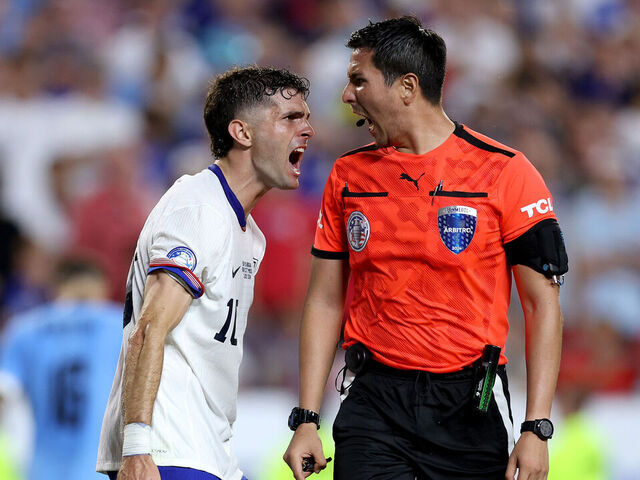
The United States was eliminated from the Copa America following a 1-0 defeat to Uruguay on Monday night, with Mathias Olivera scoring a controversial second-half goal. This result is likely to intensify calls for the U.S. Soccer Federation to consider replacing coach Gregg Berhalter ahead of the 2026 World Cup.
Uruguay’s decisive moment came in the 66th minute when Nicolas De La Cruz delivered a free kick into the U.S. penalty area. Matt Turner blocked a header by Ronald Araujo, who had outjumped defender Tim Ream, but the ball rebounded to Olivera, who scored with his left foot. Despite appearing offside on the initial header, the goal was upheld after a video review.
Berhalter’s strategy, using a lineup comprised entirely of European-based players, aimed to demonstrate progress since the team’s round-of-16 exit against the Netherlands in the 2022 World Cup. However, after a 2-0 victory over Bolivia and a surprising 2-1 loss to Panama, the U.S. faced a challenging situation against Uruguay.
“We had a good start and brought a lot of energy but at the end of the day, just not enough quality,” U.S. captain Christian Pulisic remarked. “I felt like we gave it everything but we just couldn’t score.”
Three minutes before Uruguay’s goal, the U.S. had a brief hope when Bruno Miranda equalized for Bolivia against Panama in a simultaneous match in Orlando, Florida. However, Panama ultimately won 3-1, securing the second spot in Group C behind Uruguay.
Berhalter, who was rehired in June 2023 with a contract extending through 2026, oversaw a squad featuring prominent players such as Christian Pulisic, Weston McKennie, and Tyler Adams. Despite this, the team failed to reach the quarterfinals, falling short of their 2016 Copa America performance.
The U.S. is scheduled to play friendlies against Canada and New Zealand in September.
Uruguay played without head coach Marcelo Bielsa, who was suspended for delays in sending his team out for the second half of its first two matches. Diego Reyes and Pablo Quiroga managed the team on a mild but humid night in Kansas City.
Understanding the critical nature of their situation, Berhalter and his team approached the match with urgency. Pulisic had previously mentioned the need to play “the best game of our lives” to advance, and the team displayed a determined effort throughout most of the first half.
The match featured physical play and several contentious decisions.
Folarin Balogun, who had scored twice in the tournament, was frequently targeted by Uruguay. He required assistance after a collision with Uruguayan goalkeeper Sergio Rochet and was later brought down by Araujo, eventually leaving the game with a hip injury. Ricardo Pepi replaced him.
Uruguay also suffered a setback when Maximiliano Araujo was stretchered off following a collision with Ream, though he was able to move his arms as he left the field.
Referee Kevin Ortega of Peru was central to the controversy, making several questionable calls that disadvantaged the U.S. One instance involved Ortega initially pulling out a yellow card but allowing play to continue, nearly leading to a Uruguayan goal. Another was a handball against Uruguay that was called back for a free kick, negating a U.S. advantage.
Antonee Robinson expressed his frustration, calling it “amateur hour” but acknowledged the team’s shortcomings. “The result is on us,” he said, “and we weren’t good enough.”
Uruguay increased their pressure in the second half, leading to Olivera’s goal and putting the U.S. in a desperate situation. Despite some promising runs and opportunities, the U.S. team could not score the necessary goals to advance.
“I mean, now it’s just about getting a little bit of rest and regrouping and finding an identity again, and we have some big things ahead,” Pulisic said. “We’re going to look forward to that.”
